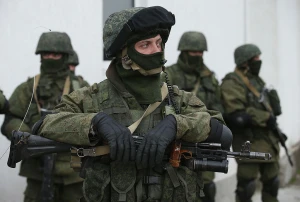
Kremlin threatens South Africa with war if Putin arrested at BRICS summit
South African President Cyril Ramaphosa said in his affidavit that the Kremlin had threatened him with war if Putin was arrested during the BRICS summit
This was reported by South Africa’s IOL website.
On Tuesday, the South Gauteng High Court in Johannesburg ruled to make public Ramaphosa's confidential affidavit, which he filed in response to the ICC's order to arrest Putin if he arrives in South Africa for the BRICS summit in August.
Ramaphosa told the court that the prosecutor's statement was "completely incompetent" and stressed that Putin was to be arrested if he arrived at the summit.
“As things stand there is no cognisable legal cause that could ever ground a mandamus to arrest and surrender President Putin. Cabinet has determined that the BRICS Summit would be held in a manner that ensures that South Africa abides by its international and legal obligations,” Ramaphosa’s affidavit read.
The South African president said that Russia had threatened the country with war if Putin was arrested.
“It would be inconsistent with our Constitution to risk engaging in war with Russia. I have constitutional obligations to protect the national sovereignty, peace and security of the Republic,” Ramaphosa stated.
The president called it a "fundamental mistake" for the prosecutor's office to assume that once the ICC issued an arrest warrant for Putin, South Africa would be obliged to publicly announce that it would arrest the Russian president.
"The government knows its obligations. It sees no need to announce this publicly. South Africa has the right to consider confidentially how it is going to process the warrant," Ramaphosa added.
The BRICS summit and Putin's arrest
On March 17, an arrest warrant was issued by the International Criminal Court for Vladimir Putin and Maria Lvova-Belova, the Russian commissioner for children's rights. This warrant is based on suspicions of their involvement in war crimes, specifically the illegal deportation of Ukrainians, including children.
After that, Brazil hinted that Putin could be arrested in the country on the basis of a warrant issued by the International Criminal Court.
Ukraine's Foreign Minister, commenting on the ICC's decision, said that "the wheels of justice are turning," while Human Rights Watch called the arrest warrant for Putin a "wake-up call" for those who commit or conceal abuses.
Later, these countries' comments were joined by representatives of the United Kingdom and Canada, who unequivocally supported the court's position.
Also, US President Joe Biden said that the ICC's arrest warrant for Putin was justified because the Russian president had committed war crimes.
Lawyer Kateryna Busol believed that South Africa would try to persuade Putin not to attend the BRICS summit in August. Later, Foreign Minister Sergey Lavrov said he planned to attend a meeting of BRICS foreign ministers in South Africa on June 1-2.
In mid-April, South Africa expressed concern that the court-issued arrest warrant for Russian leader Vladimir Putin was causing obstacles ahead of the BRICS summit scheduled for August.
On April 26, South Africa announced that it would not withdraw from the jurisdiction of the International Criminal Court, which issued an arrest warrant for Putin.
On May 1, the South African authorities informally warned Russia that they would be forced to arrest Putin under an ICC warrant if he came to the country for the BRICS summit.
On May 30, South Africa announced that it would not overturn the ICC's decisions, but would grant diplomatic immunity to participants in the BRICS summit in August.
On July 15, International Criminal Court prosecutor Karim Khan said South Africa should do "the right thing" by respecting international law and hand over Putin if he attends the BRICS summit in Johannesburg next month.
- News












































